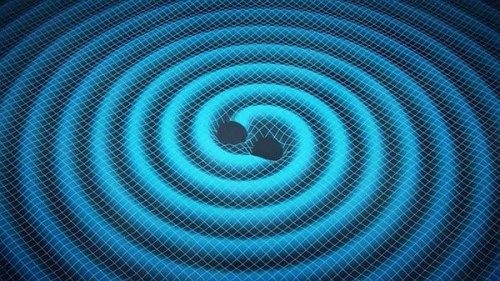
Visualization - Gravitational waves generated by a binary system. (Photo/NASA)
The discovery of gravitational waves by the American Laser Interferometer Gravitational-wave Observatory (LIGO) last week has encouraged the research community in China.
"Although Chinese scientists contributed to this discovery, it paled in comparison to huge amount of investment in sci-tech research," said Wang Yifang, head of the Chinese Academy of Sciences (CAS) high-energy physics institute.
In his article, "Why did we miss the gravitational waves," published Wednesday in the People's Daily, China's flagship newspaper, Wang called for improved scientific support.
Rigid research funding regulations have hampered many projects, said Wang.
"For example, under the current conditions, no authority is responsible for granting funding for research projects with budgets between 40 million yuan (6.13 million U.S. dollars) to 300 million yuan," Wang said.
According to Wang, international cooperative projects could have access to 40 million yuan funding at most, and more than 90 percent of China's huge sci-tech research funding is channeled to domestic projects.
"This has resulted in Chinese scientists giving up on international research projects including the one with LIGO," said Wang.
Since 2014, China has been attempting to modernize its sci-tech research management, to streamline state-funded programs and improve the efficiency of distribution of government funding.
To this end, over 100 programs have been merged into five plans: natural science, major sci-tech, key research & development plan, technical innovation and the sci-tech human resources.
The national R&D plan, the first to be started, was publicized Tuesday.
"The next 30 years will be a key period for China's development in science and technology. Therefore, more should be done to update the sci-tech research system in China," said Wang.
Wang expects China to take the lead in the future in the area of gravitational wave research through domestic projects and actively engaging in major international programs.
"We are using the new discovery as a way to inspire our own domestic work," said Wang.
Chinese scientists announced on Tuesday the "Taiji" research program on gravitational waves from the merging of binary black holes and other celestial bodies.
Hu Wenrui, scientist with the CAS and chief scientist on the program, announced the launch of three satellites that will detect gravitational waves around 2030 and complementary research with the European Space Agency (ESA) laser interferometer space antenna (LISA) project, which plans to launch satellites around 2035.
Unlike the LIGO research, which was conducted from a ground-based observatory, Taiji will observe the waves from space.
Meanwhile, Taiji has its own domestic competitors. Sun Yat-sen University in southern China's Guangdong Province initiated the "Tianqin" space research project in July, which is awaiting government approval at present.
According to Li Miao, dean of the university's institute of astronomy and space science, Tianqin will feature four stages over the next 15 to 20 years, ultimately launching three high-orbit satellites to detect the waves.
Another domestic gravitational wave project "Ali," named after the ground-based CAS observatory in Ali, Tibet, and led by the CAS high-energy physics institute, has totally different objectives -- detecting the first tremors of the Big Bang, primordial gravitational waves.
"Ali will be the first project detecting primordial gravitational waves in the sky above the Northern Hemisphere. If it succeeds, it will be the next milestone in cosmology as well as high energy physics," said Su Meng, a Chinese researcher at the department of physics, Massachusetts Institute of Technology (MIT).
Su explained that the projects will each develop detectors to look for different frequencies of gravitational waves.
Chinese scientists are seeking international cooperation and foreign specialists.
"China lags behind in gravitational wave research in terms of technology. We hope international cooperation will help us," said Hu.
The research team of Taiji has made agreements with International Max Planck Research School and Leibniz University of Hannover. Harvard, MIT and the University of Chicago have expressed interest in Ali.


















































